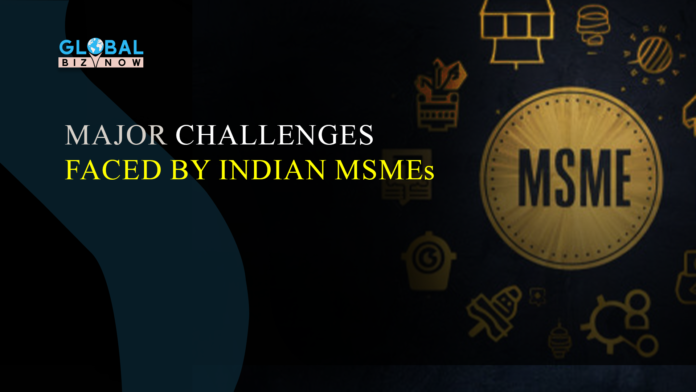Micro, Small, and Medium Enterprises (MSMEs) is the backbone of the Indian economy. MSME’s contribute up to 30% of the country’s GDP, giving employment for over 110 million people. However, a number of challenges sickening the sector, from difficulty accessing financing to regulatory hurdles that threaten the prospects of the future. The resilience of MSMEs will largely influence the success of the country in meeting its ambitious target of growing the economy.
Access to Capital: Funding Issues
Access to easy capital is a pressing issue for MSMEs. These businesses have limited access to loans compared to large businesses, which rely on informal and personal sources, including savings, for finance. There is a funding gap of about $380 billion as more than 80% of MSMEs in India are found not to have access to formal credit as they require. Banks shy away from lending to MSMEs, saying that the credit history isn’t well-documented, there is no collateral to pledge for, and it is mostly small amounts.
As part of the COVID-19 pandemic relief programme, the government set up ECLGS, which has assisted more than 12 million MSMEs in bringing easy access to credit. However, such a scheme must be supported in the long term by MSMEs. The partnerships with fintech firms expanding digital lending and credit records digitizing may ensure better prospects for growth and fairer access to funds for MSMEs.
Technologies Lagging: digital divide
Though this digital economy is mushrooming, many MSMEs are struggling with the adoption of technologies necessary to gain an edge. Online presence is there for only 25% of MSMEs, and even lesser sections try to use online payment methods or e-commerce channels to reach out to customers. The outcome is a digital divide that holds many businesses back from expanding markets, optimizing operations, and improving customer engagement.
The pandemic has really thrown light upon the need for digital transformation. As an effort to overcome this, the government has set up the Udyam Registration platform with the motive of connecting MSMEs into the digital world in an easier manner. The tech giants-Amazon and Google-have also come up with initiatives to support small businesses in making their operational things digital. However, much more efforts are needed for making digital tools accessible and affordable to smaller businesses so that they can compete with others.
Skill and Human Resource Gaps
Next, the major challenge MSMEs face is skilled labor. Except for the very small minority, almost 90% of MSME workers are lacking in skills, which renders them less productive. Thus, MSMEs find it even harder to be competitive businesses. The major gaps in skills are management and technology areas, which are critical to innovation and growth.
Initiatives like Skill India are designed to improve the skill levels of the worker, yet most of the training initiatives fail to reach MSMEs in the rural area, which houses most small enterprises. In this context, training programs will need to be made accessible and affordable enough for the MSME so that these may equip their workforce with the necessary skills to compete and succeed.
Regulatory Roadblocks: A Complex System
Another challenge the MSMEs in India face is the complicated regulation. Tax filings and labor laws are part of a lot of rules that small businesses need to negotiate. According to the report compiled by the World Bank, relative low ranking in ease of doing business for smaller enterprises due to the obstructions from the bureaucratic processes.
Although the government has gone to an extent of streamlining some of its regulations by consolidating labor laws into new codes, for more minor MSMEs with less administrative capabilities, the same compliance burden remains onerous. Streamlined regulations coupled with limited paperwork and single-window clearances would allow MSMEs to comply easily without demoralizing them with their limited resources.
Limited Market Access and Competition
Compared to the big companies and foreign products, especially China, MSMEs are often lagging in competition. Without upgrading their products and thus penetration into bigger markets, most of the MSMEs are always lagging behind. Such efforts like ZED certification and Make in India initiative to MSME can promote them to take better quality and move towards export markets but low turn-up due to low awareness and high costs.
The new platform of e-commerce has emerged as a vital mechanism by which MSMEs can reach wider customers. Nonetheless, many small enterprises are unwilling to join due to an example of logistics issues, competitive pricing, and the cost that online selling will require. The rise in government support regarding the extension of export incentives and training in e-commerce will let MSMEs overcome all these hurdles and enter new markets.
A Way Forward
But the MSMEs in India are vast, requiring much support for these issues. Access to funds on a fair playing field, closing the digital divide, training skilled labor, simplifying regulations, and enabling access to markets are some of the foremost steps if MSMEs are to grow and help drive India’s ambitions for growth. This will require a joint effort with the government, financial institutions, and private sector partners to support MSMEs overcome their respective limitations.
India’s journey toward being a $5 trillion economy would necessitate full support from the MSME sector. Provided that such small enterprises receive sufficient support, they should grow and contribute to the economy and help fulfill the enormous growth potential of the country. For now, though, it remains a complex but vitally necessary task: how India’s economy is going to overcome the MSME conundrum.



